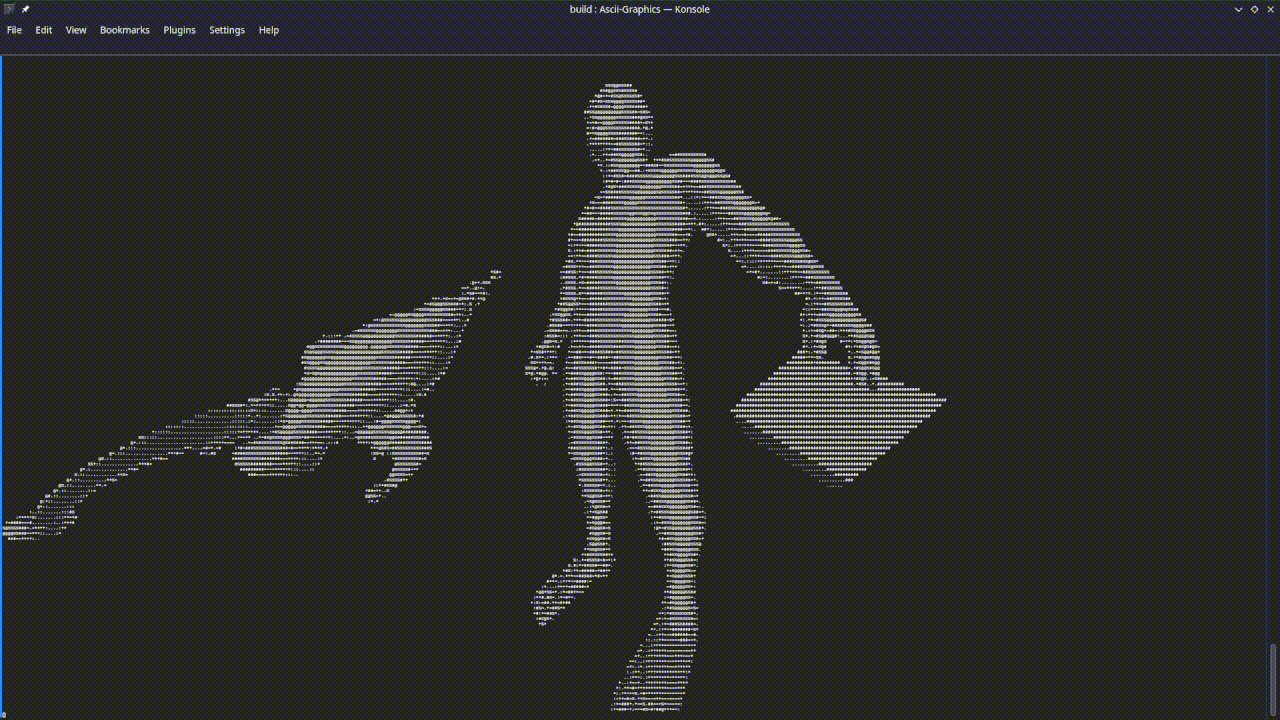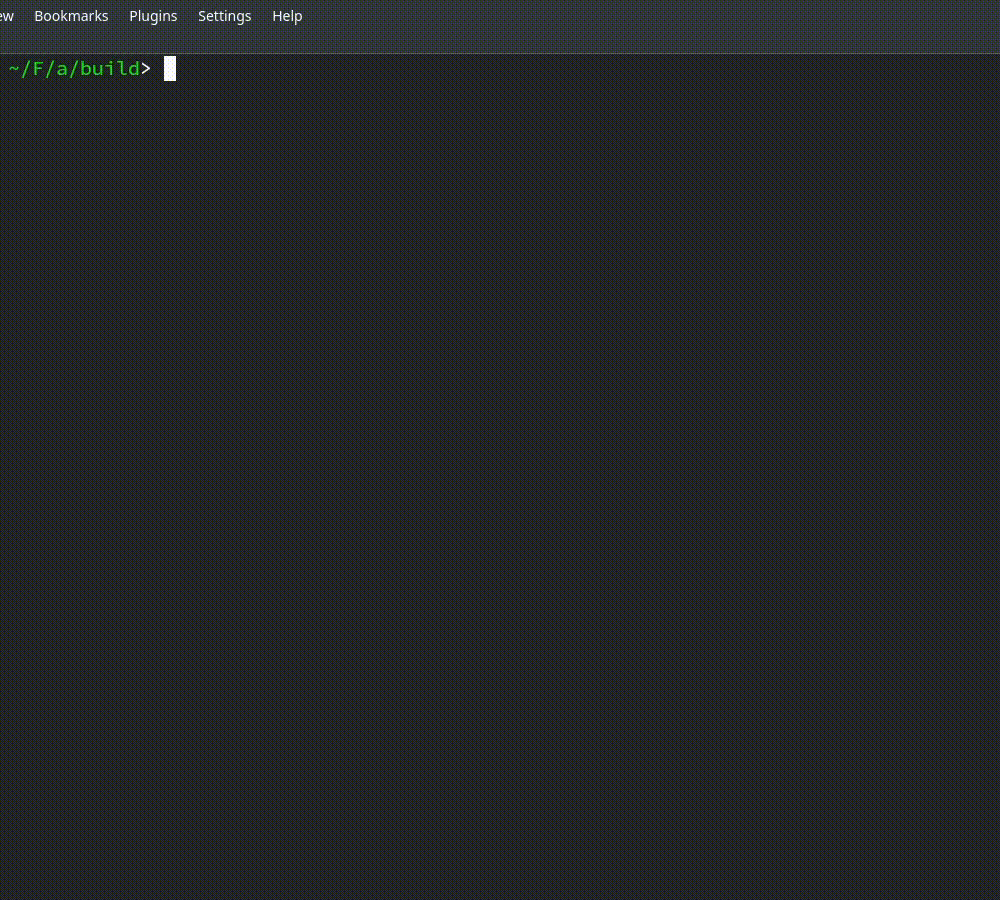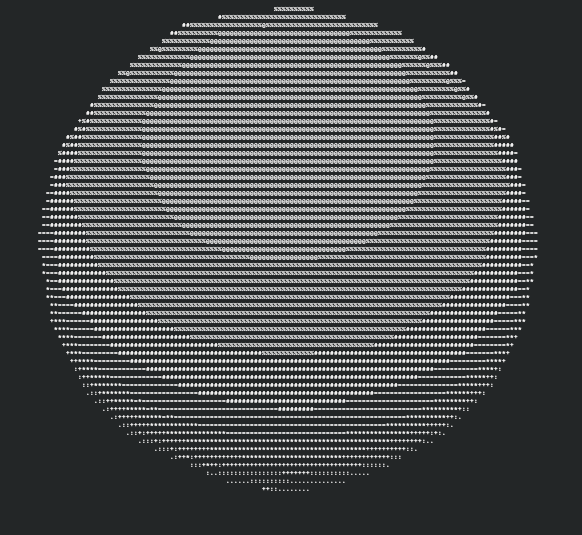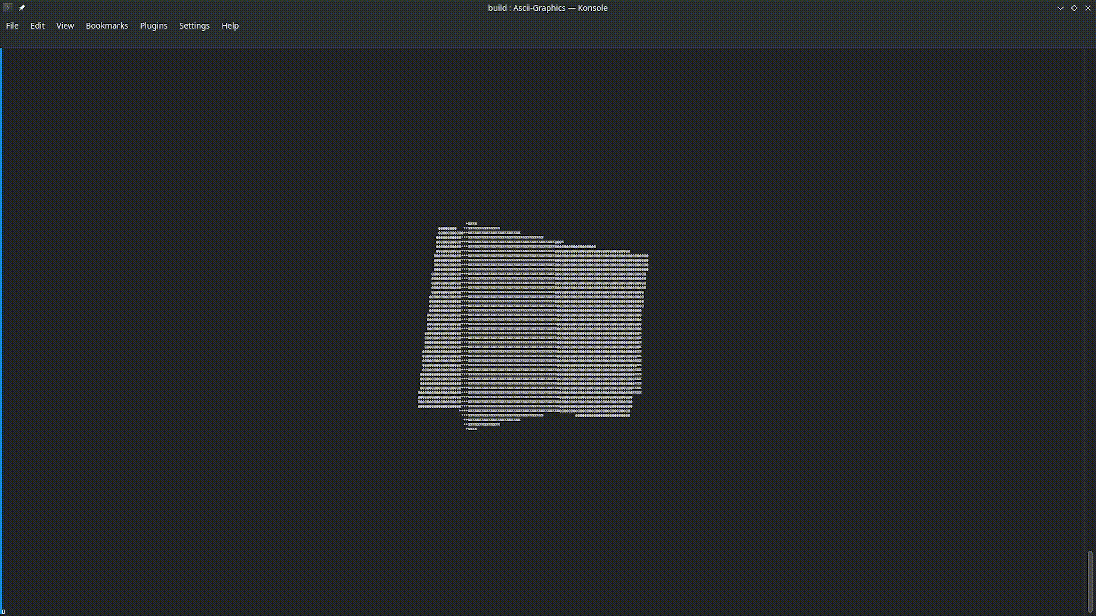 7 |
8 |
7 |
8 | ASCII Graphics
9 | 10 |11 | C++ 3D graphics library that runs in a Linux terminal 12 |
13 | 7 |
8 |
7 |
8 | 11 | C++ 3D graphics library that runs in a Linux terminal 12 |
13 | 19 |
20 | Ascii-graphics is a basic 3D graphics library designed to run in a linux terminal.
21 |
22 |
23 | ## Features
24 |
25 | Below shows some key features of the ascii-graphics library.
26 |
27 | ### Custom OBJ Model Loading
28 |
29 |
19 |
20 | Ascii-graphics is a basic 3D graphics library designed to run in a linux terminal.
21 |
22 |
23 | ## Features
24 |
25 | Below shows some key features of the ascii-graphics library.
26 |
27 | ### Custom OBJ Model Loading
28 |
29 |  30 |
31 | ### Smooth Lighting
32 |
33 |
30 |
31 | ### Smooth Lighting
32 |
33 |  34 |
35 | ### Z Buffering
36 |
37 |
34 |
35 | ### Z Buffering
36 |
37 |  38 |
39 | ### Other Features
40 | * Outline meshes
41 | * Wireframe mode
42 | * Fill entire mesh with single character
43 | * Basic lighting
44 |
45 | ## Installation
46 |
47 | 1. Clone the repo
48 | ```
49 | git clone https://github.com/addr0x414b/ascii-graphics.git
50 | ```
51 | 2. In the cloned folder, create a build directory and cd to it
52 | ```
53 | mkdir build && cd build
54 | ```
55 | 3. Run cmake
56 | ```
57 | cmake ../
58 | ```
59 | 4. Run make
60 | ```
61 | make
62 | ```
63 | 5. Run the program
64 | ```
65 | ./Ascii-Graphics
66 | ```
67 |
68 |
69 | ## Usage
70 |
71 | Below is the default code the repo comes with:
72 |
73 | ```c++
74 | //ascii-graphics.cpp
75 |
76 | int gScreenWidth = 200; // Define the screens width and height
77 | int gScreenHeight = 50;
78 | float gAspect = (float)gScreenWidth / (float)gScreenHeight;
79 |
80 | int main() {
81 |
82 | Camera camera(0.0f, 0.0f, 0.0f, gAspect); // Define the scenes camera
83 | LightD light; // Define the scenes light
84 | Screen screen(gScreenWidth, gScreenHeight, camera, light); // Define the screen of the scene
85 |
86 | Cube cube; // Library comes with one default mesh
87 | cube.translate(0.0f, 0.0f, -4.f); // Must translate the mesh away from the camera (-z is into the screen)
88 |
89 | float deg = 0.1f;
90 | while (1) { // Screen loop
91 | screen.start(); // Begin calculating the delta time per frame
92 |
93 | cube.rotate(0.0f, deg, deg); // Rotate cube
94 | deg += 50 * screen.deltaTime; // Increase the degrees of rotation
95 |
96 | screen.shadeMesh(cube); // Print the cube into the buffer
97 |
98 | screen.print(); // Print the buffer
99 | screen.clear(); // Clear the screen
100 | }
101 |
102 | return 0;
103 | }
104 | ```
105 |
106 | ### Create Scene
107 |
108 | 1. Define size of the screen
109 | ```c++
110 | int gScreenWidth = 200; // Width and height should be no larger than terminal
111 | int gScreenHeight = 50; // Can increase size with decreased terminal font size
112 | float gAspect = (float)gScreenWidth / (float)gScreenHeight;
113 | ```
114 | 2. Define camera, light, and screen
115 | ```c++
116 | Camera camera(0.0f, 0.0f, 0.0f, gAspect); // Constructor uses default projection values
117 | LightD light; // Define the scenes light
118 | Screen screen(gScreenWidth, gScreenHeight, camera, light); // Define the screen
119 | ```
120 |
121 | ### To Load a Custom Mesh
122 |
123 | 1. Mesh MUST be in OBJ format
124 | 2. Mesh MUST be triangulated, with normals
125 | 3. OBJ file should be in the same directory as the ascii-graphics.cpp file
126 | 4. File path MUST have "../" in front (assuming file is in the same directory as ascii-graphics.cpp)
127 |
128 | * Flat Shaded Mesh:
129 | ```c++
130 | Mesh meshName("../path_to_flat_mesh.obj"); // Load a FLAT SHADED mesh
131 | meshName.translate(0.0f, 0.0f, -4.0f); // Translate the mesh away from the camera
132 | ```
133 |
134 | * Smooth Shaded Mesh:
135 | ```c++
136 | Mesh meshName(1, "../path_to_smooth_mesh.obj") // Load a SMOOTH SHADED mesh
137 | meshName.translate(0.0f, 0.0f, -4.0f); // Translate the mesh away from the camera
138 | ```
139 |
140 | ### Display the Graphics
141 |
142 | ```c++
143 | float deg = 0.1f;
144 | while (1) { // Screen loop
145 | screen.start(); // Begin calculating the delta time per frame
146 |
147 | cube.rotate(0.0f, deg, deg); // Rotate cube
148 | deg += 50 * screen.deltaTime; // Increase the degrees of rotation
149 |
150 | screen.shadeMesh(cube); // Print the cube into the buffer
151 |
152 | screen.print(); // Print the buffer
153 | screen.clear(); // Clear the screen
154 | }
155 |
156 | ```
157 |
158 | ### Different Display Methods
159 |
160 | * Display a smooth shaded mesh
161 | ```c++
162 | screen.shadeMeshSmooth(meshName);
163 | ```
164 |
165 | * Display a flat shaded mesh
166 | ```c++
167 | screen.shadeMesh(meshName);
168 | ```
169 |
170 | * Fill entire mesh with a single character, no shading
171 | ```c++
172 | screen.fillMesh(meshName, '*'); // Pick character here
173 | ```
174 |
175 | * Show mesh triangles
176 | ```c++
177 | screen.drawMesh(meshName, '*'); // Pick character here
178 | ```
179 |
180 | * Display wireframe of mesh
181 | ```c++
182 | screen.drawMeshWire(meshName, '*'); // Pick character here
183 | ```
184 |
185 | * Can combine different methods
186 | ```c++
187 | // Results in an outlined cube
188 | screen.drawMesh(cube, '#'); // Draw the triangles of the cube
189 | screen.fillMesh(cube, '*'); // Fill in the cube
190 | ```
191 |
192 |
193 | ## License
194 |
195 | Distributed under the MIT License. See `LICENSE` for more information.
196 |
197 |
198 | ## Contact
199 |
200 | YouTube: https://www.youtube.com/watch?v=X4QSm_p7Cy4
201 |
202 |
203 | ## Acknowledgments
204 |
205 | Thanks to the following for allowing use of their 3D models:
206 |
207 | * [Man model by printable_models](https://free3d.com/3d-model/male-base-mesh-6682.html)
208 | * [Rocket model by Paul Chen uploaded by nixor](https://free3d.com/3d-model/rocket-ship-v1--579030.html)
209 | * [Cat model by snippysnappets](https://free3d.com/3d-model/low-poly-cat-46138.html)
210 |
211 |
212 |
--------------------------------------------------------------------------------
/ascii-graphics.cpp:
--------------------------------------------------------------------------------
1 | #include
38 |
39 | ### Other Features
40 | * Outline meshes
41 | * Wireframe mode
42 | * Fill entire mesh with single character
43 | * Basic lighting
44 |
45 | ## Installation
46 |
47 | 1. Clone the repo
48 | ```
49 | git clone https://github.com/addr0x414b/ascii-graphics.git
50 | ```
51 | 2. In the cloned folder, create a build directory and cd to it
52 | ```
53 | mkdir build && cd build
54 | ```
55 | 3. Run cmake
56 | ```
57 | cmake ../
58 | ```
59 | 4. Run make
60 | ```
61 | make
62 | ```
63 | 5. Run the program
64 | ```
65 | ./Ascii-Graphics
66 | ```
67 |
68 |
69 | ## Usage
70 |
71 | Below is the default code the repo comes with:
72 |
73 | ```c++
74 | //ascii-graphics.cpp
75 |
76 | int gScreenWidth = 200; // Define the screens width and height
77 | int gScreenHeight = 50;
78 | float gAspect = (float)gScreenWidth / (float)gScreenHeight;
79 |
80 | int main() {
81 |
82 | Camera camera(0.0f, 0.0f, 0.0f, gAspect); // Define the scenes camera
83 | LightD light; // Define the scenes light
84 | Screen screen(gScreenWidth, gScreenHeight, camera, light); // Define the screen of the scene
85 |
86 | Cube cube; // Library comes with one default mesh
87 | cube.translate(0.0f, 0.0f, -4.f); // Must translate the mesh away from the camera (-z is into the screen)
88 |
89 | float deg = 0.1f;
90 | while (1) { // Screen loop
91 | screen.start(); // Begin calculating the delta time per frame
92 |
93 | cube.rotate(0.0f, deg, deg); // Rotate cube
94 | deg += 50 * screen.deltaTime; // Increase the degrees of rotation
95 |
96 | screen.shadeMesh(cube); // Print the cube into the buffer
97 |
98 | screen.print(); // Print the buffer
99 | screen.clear(); // Clear the screen
100 | }
101 |
102 | return 0;
103 | }
104 | ```
105 |
106 | ### Create Scene
107 |
108 | 1. Define size of the screen
109 | ```c++
110 | int gScreenWidth = 200; // Width and height should be no larger than terminal
111 | int gScreenHeight = 50; // Can increase size with decreased terminal font size
112 | float gAspect = (float)gScreenWidth / (float)gScreenHeight;
113 | ```
114 | 2. Define camera, light, and screen
115 | ```c++
116 | Camera camera(0.0f, 0.0f, 0.0f, gAspect); // Constructor uses default projection values
117 | LightD light; // Define the scenes light
118 | Screen screen(gScreenWidth, gScreenHeight, camera, light); // Define the screen
119 | ```
120 |
121 | ### To Load a Custom Mesh
122 |
123 | 1. Mesh MUST be in OBJ format
124 | 2. Mesh MUST be triangulated, with normals
125 | 3. OBJ file should be in the same directory as the ascii-graphics.cpp file
126 | 4. File path MUST have "../" in front (assuming file is in the same directory as ascii-graphics.cpp)
127 |
128 | * Flat Shaded Mesh:
129 | ```c++
130 | Mesh meshName("../path_to_flat_mesh.obj"); // Load a FLAT SHADED mesh
131 | meshName.translate(0.0f, 0.0f, -4.0f); // Translate the mesh away from the camera
132 | ```
133 |
134 | * Smooth Shaded Mesh:
135 | ```c++
136 | Mesh meshName(1, "../path_to_smooth_mesh.obj") // Load a SMOOTH SHADED mesh
137 | meshName.translate(0.0f, 0.0f, -4.0f); // Translate the mesh away from the camera
138 | ```
139 |
140 | ### Display the Graphics
141 |
142 | ```c++
143 | float deg = 0.1f;
144 | while (1) { // Screen loop
145 | screen.start(); // Begin calculating the delta time per frame
146 |
147 | cube.rotate(0.0f, deg, deg); // Rotate cube
148 | deg += 50 * screen.deltaTime; // Increase the degrees of rotation
149 |
150 | screen.shadeMesh(cube); // Print the cube into the buffer
151 |
152 | screen.print(); // Print the buffer
153 | screen.clear(); // Clear the screen
154 | }
155 |
156 | ```
157 |
158 | ### Different Display Methods
159 |
160 | * Display a smooth shaded mesh
161 | ```c++
162 | screen.shadeMeshSmooth(meshName);
163 | ```
164 |
165 | * Display a flat shaded mesh
166 | ```c++
167 | screen.shadeMesh(meshName);
168 | ```
169 |
170 | * Fill entire mesh with a single character, no shading
171 | ```c++
172 | screen.fillMesh(meshName, '*'); // Pick character here
173 | ```
174 |
175 | * Show mesh triangles
176 | ```c++
177 | screen.drawMesh(meshName, '*'); // Pick character here
178 | ```
179 |
180 | * Display wireframe of mesh
181 | ```c++
182 | screen.drawMeshWire(meshName, '*'); // Pick character here
183 | ```
184 |
185 | * Can combine different methods
186 | ```c++
187 | // Results in an outlined cube
188 | screen.drawMesh(cube, '#'); // Draw the triangles of the cube
189 | screen.fillMesh(cube, '*'); // Fill in the cube
190 | ```
191 |
192 |
193 | ## License
194 |
195 | Distributed under the MIT License. See `LICENSE` for more information.
196 |
197 |
198 | ## Contact
199 |
200 | YouTube: https://www.youtube.com/watch?v=X4QSm_p7Cy4
201 |
202 |
203 | ## Acknowledgments
204 |
205 | Thanks to the following for allowing use of their 3D models:
206 |
207 | * [Man model by printable_models](https://free3d.com/3d-model/male-base-mesh-6682.html)
208 | * [Rocket model by Paul Chen uploaded by nixor](https://free3d.com/3d-model/rocket-ship-v1--579030.html)
209 | * [Cat model by snippysnappets](https://free3d.com/3d-model/low-poly-cat-46138.html)
210 |
211 |
212 |
--------------------------------------------------------------------------------
/ascii-graphics.cpp:
--------------------------------------------------------------------------------
1 | #include